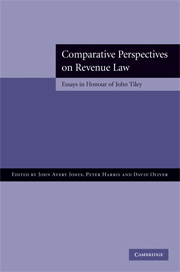Book contents
- Frontmatter
- Contents
- Contributors and affiliations
- Foreword by Dave Hartnett
- Foreword by Hugh Ault
- 1 A comparison of statutory general anti-avoidance rules and judicial general anti-avoidance doctrines as a means of controlling tax avoidance: Which is better? (What would John Tiley think?)
- 2 The judicial approach to avoidance: some reflections on BMBF and SPI
- 3 Comparing the application of judicial interpretative doctrines to revenue statutes on opposite sides of the pond
- 4 Abuse of rights and European tax law
- 5 The US legislative and regulatory approach to tax avoidance
- 6 The law of taxation and unjust enrichment
- 7 The history of royalties in tax treaties 1921–61: Why?
- 8 Land taxation, economy and society in Britain and its colonies
- 9 Meade and inheritance tax
- 10 Taxation, human rights and the family
- 11 Family connections and the corporate entity: income splitting through the family company
- Epilogue: Establishing the foundations of tax law in UK universities
- References
- Table of cases
- Table of abbreviations
- Index
3 - Comparing the application of judicial interpretative doctrines to revenue statutes on opposite sides of the pond
Published online by Cambridge University Press: 07 December 2009
- Frontmatter
- Contents
- Contributors and affiliations
- Foreword by Dave Hartnett
- Foreword by Hugh Ault
- 1 A comparison of statutory general anti-avoidance rules and judicial general anti-avoidance doctrines as a means of controlling tax avoidance: Which is better? (What would John Tiley think?)
- 2 The judicial approach to avoidance: some reflections on BMBF and SPI
- 3 Comparing the application of judicial interpretative doctrines to revenue statutes on opposite sides of the pond
- 4 Abuse of rights and European tax law
- 5 The US legislative and regulatory approach to tax avoidance
- 6 The law of taxation and unjust enrichment
- 7 The history of royalties in tax treaties 1921–61: Why?
- 8 Land taxation, economy and society in Britain and its colonies
- 9 Meade and inheritance tax
- 10 Taxation, human rights and the family
- 11 Family connections and the corporate entity: income splitting through the family company
- Epilogue: Establishing the foundations of tax law in UK universities
- References
- Table of cases
- Table of abbreviations
- Index
Summary
Introduction
Both the UK and the US have extraordinarily detailed revenue laws, although they differ in structure. The UK income tax is schedular, while (with some exceptions) the US federal income tax tends to a global computation. In both countries, the complexity of the statutes, which is itself intended to reduce ambiguity and tax planning opportunities, in fact often gives rise to unintended tax planning schemes.
As John Tiley so cogently notes in his magnificent treatise, Revenue Law, ‘[n]o legislature can allow taxpayers to continue to arrange their affairs in such a way that the tax system becomes voluntary (pay the Revenue or pay an advisor) …’ Yet in both the US and the UK, the statutory pattern is such that taxpayers frequently arrange transactions to fit literally the statutory language with the goal of reducing the tax burden on the particular transaction or even to create an apparent loss that might be offset against income from other transactions in calculating their income tax liability. This behaviour creates a dilemma for the legislature, the tax administrators, and the courts, because, as Tiley also notes –
[t]ax equity demands that artificial tax avoidance schemes should be of no effect, yet certainty demands that the tax laws should be such that an individual can arrange his affairs in the expectation that he will or will not have to pay tax.
The judiciary in both the UK and the US must constantly grapple with this tension in interpreting and applying the revenue laws.
- Type
- Chapter
- Information
- Comparative Perspectives on Revenue LawEssays in Honour of John Tiley, pp. 40 - 74Publisher: Cambridge University PressPrint publication year: 2008
- 1
- Cited by



